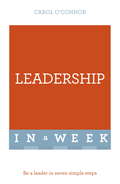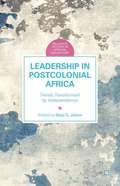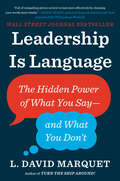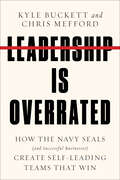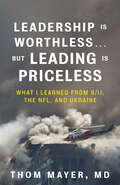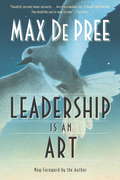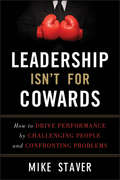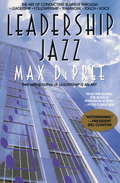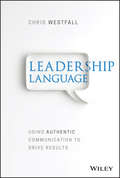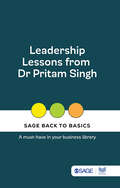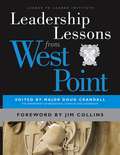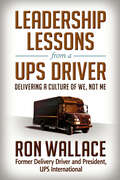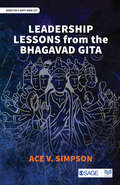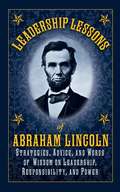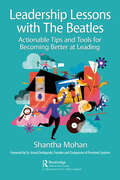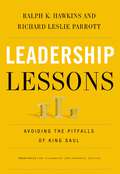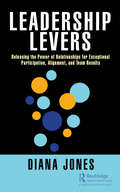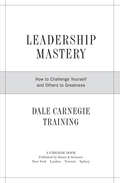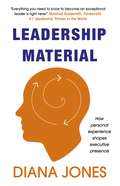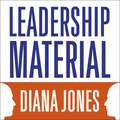- Table View
- List View
Leadership In A Week: Be A Leader In Seven Simple Steps
by Carol O'ConnorLeadership In A Week is a simple and straightforward guide to leadership success, giving you everything you need to know in just seven short chapters. From inspiring others and gaining their support, to setting priorities, giving direction and making decisions, you'll explore your inner resources and discover your untapped leadership qualities.This book introduces you to the main themes and ideas of leading, giving you a basic knowledge and understanding of the key concepts, together with practical and thought-provoking exercises. Whether you choose to read it in a week or in a single sitting, Leadership In A Week is your fastest route to success:- Sunday: Self-awareness- Monday: Understanding people- Tuesday: Communication- Wednesday: Authority and power- Thursday: Making decisions- Friday: Connecting and linking- Saturday: Vision and inspirationABOUT THE SERIESIn A Week books are for managers, leaders, and business executives who want to succeed at work. From negotiating and content marketing to finance and social media, the In A Week series covers the business topics that really matter and that will help you make a difference today. Written in straightforward English, each book is structured as a seven-day course so that with just a little work each day, you will quickly master the subject. In a fast-changing world, this series enables readers not just to get up to speed, but to get ahead.
Leadership In Balance
by Linda S. Gravett John F. KuciaLeadership in Balance provides readers with a deeper understanding of the art, practice, and discipline of purpose-driven collaboration, and teaches them how new leadership habits of the mind will positively impact an organization's learning, growth, and change.
Leadership In Colonial Africa
by Baba G. JallowLeadership in Colonial Africa highlights colonial disruptions of traditional leadership patterns in Africa and how African leaders, traditional and nationalist, reacted to these disruptions.
Leadership In Postcolonial Africa
by Baba G. JallowLeadership in Post-Colonial Africa examines the leadership concepts and lessons that emerged during and after the attainment of independence with insightful studies of Africa's first female presidents, gangster elitism, Nelson Mandela, and beyond.
Leadership Is Language: The Hidden Power of What You Say--and What You Don't
by L. David MarquetFrom the acclaimed author of Turn the Ship Around!, former US Navy Captain David Marquet, comes a radical new playbook for empowering your team to make better decisions and take greater ownership.You might imagine that an effective leader is someone who makes quick, intelligent decisions, gives inspiring speeches, and issues clear orders to their team so they can execute a plan to achieve your organization's goals. Unfortunately, David Marquet argues, that's an outdated model of leadership that just doesn't work anymore.As a leader in today's networked, information-dense business climate, you don't have full visibility into your organization or the ground reality of your operating environment. In order to harness the eyes, ears, and minds of your people, you need to foster a climate of collaborative experimentation that encourages people to speak up when they notice problems and work together to identify and test solutions. Too many leaders fall in love with the sound of their own voice, and wind up dictating plans and digging in their heels when problems begin to emerge. Even when you want to be a more collaborative leader, you can undermine your own efforts by defaulting to command-and-control language we've inherited from the industrial era.It's time to ditch the industrial age playbook of leadership. In Leadership is Language, you'll learn how choosing your words can dramatically improve decision-making and execution on your team. Marquet outlines six plays for all leaders, anchored in how you use language: • Control the clock, don't obey the clock: Pre-plan decision points and give your people the tools they need to hit pause on a plan of action if they notice something wrong. • Collaborate, don't coerce: As the leader, you should be the last one to offer your opinion. Rather than locking your team into binary responses ("Is this a good plan?"), allow them to answer on a scale ("How confident are you about this plan?") • Commit, don't comply: Rather than expect your team to comply with specific directions, explain your overall goals, and get their commitment to achieving it one piece at a time. • Complete, not continue: If every day feels like a repetition of the last, you're doing something wrong. Articulate concrete plans with a start and end date to align your team. • Improve, don't prove: Ask your people to improve on plans and processes, rather than prove that they can meet fixed goals or deadlines. You'll face fewer cut corners and better long-term results. • Connect, don't conform: Flatten hierarchies in your organization and connect with your people to encourage them to contribute to decision-making.In his last book, Turn the Ship Around!, Marquet told the incredible story of abandoning command-and-control leadership on his submarine and empowering his crew to turn the worst performing submarine to the best performer in the fleet. Now, with Leadership is Language he gives businesspeople the tools they need to achieve such transformational leadership in their organizations.
Leadership Is Overrated: How the Navy SEALs (and Successful Businesses) Create Self-Leading Teams That Win
by Kyle Buckett Chris MeffordAn award-winning pair of executive consultants reveal why to be successful, businesses need self-leading teams, not just good leadership. “In a society so obsessed with leadership, why are we so bad at it?”Despite the countless seminars, courses, and management books designed to hone good leaders, over 79% of employees leave their jobs due to poor leadership. Why is this happening? Award-winning executive consultant Chris Mefford and retired, high-ranking US Navy SEAL trainer Kyle Buckett argue that organizations need more than just leaders. They need successful teams.Mefford and Buckett are passionate about how our leadership model has failed and spotlight a new work culture that actually works. In Leadership Is Overrated, they draw on the SEAL model and on their decades of knowledge and experience coaching industry leaders to answer the question: what makes a productive team? The surprising truth is that behind every successful team is a cadre of empowered, self-starting employees.In this revolutionary guide, Mefford and Buckett share crucial leadership strategies to help organizations revamp their work culture, throw out stifling hierarchical leadership models, and embrace a dynamic, results-oriented, and successful self-led team-oriented model instead.
Leadership Is Worthless…But Leading Is Priceless: What I Learned from 9/11, the NFL, and Ukraine
by Thom MayerPractical leadership for difficult times, from a crisis management expert who has led response teams through the 9/11 Pentagon attack, NFL on-field medical emergencies, and the war in Ukraine.Dr. Thom Mayer knows first-hand that true leadership stems from our actions, not our positions, especially in times of crisis.Drawing on his experiences heading the 9/11 Pentagon rescue efforts, dealing with on-field emergencies in the NFL (he was at Damar Hamlin’s bedside after his injury), training mobile response medical teams in Ukraine, and more, Mayer covers such topics as:Why trust is vital for innovationThe critical role of failure in devising new ways of leadingHow questions fuel innovative actionWhy every leader should have the title Chief Story TellerThe importance of distinguishing between data, knowledge, and wisdomEach chapter begins with a provocative and seemingly contradictory statement, like the book’s title, and includes stories, historical examples, and literary lessons selected to guide pragmatic and practical solutions.Leadership is worthless because it is something you say, a noun. But leading is priceless because it is a verb—it is the things we do that make a difference. From Pentagon generals to corporate CEOs to football players on the field to parents driving their kids to school, Mayer shows how leaders ensure that their actions will help others to succeed.
Leadership Is an Art
by Max DepreeLEADERSHIP IS AN ART has long been a must-read not only within the business community but also in professions ranging from academia to medical practices, to the political arena. First published in 1989, the book has sold more than 800,000 copies in hardcover and paperback. This revised edition brings Max De Pree's timeless words and practical philosophy to a new generation of readers.De Pree looks at leadership as a kind of stewardship, stressing the importance of building relationships, initiating ideas, and creating a lasting value system within an organization. Rather than focusing on the "hows" of corporate life, he explains the "whys." He shows that the first responsibility of a leader is to define reality and the last is to say thank you. Along the way, the artful leader must: * Stimulate effectiveness by enabling others to reach both their personal potential and their institutional potential * Take a role in developing, expressing, and defending civility and values* Nurture new leaders and ensure the continuation of the corporate cultureLEADERSHIP IS AN ART offers a proven design for achieving success by developing the generous spirit within all of us. Now more than ever, it provides the insights and guidelines leaders in every field need.From the Trade Paperback edition.
Leadership Isn't For Cowards: How to Drive Performance by Challenging People and Confronting Problems
by Mike StaverA no-nonsense guide to driving performance while still maintaining a great place to work Leadership Isn't For Cowards offers straightforward steps to leading courageously and practical tips for driving performance. Courageous leadership means toughening your approach by being rigorous in the application of your values through the company culture. It means confronting and challenging people, and not letting them get away with being less than you know they can be. The path to courageous leadership has six components: Accept Your Current Circumstances, Take Responsibility, Take Action, Acknowledge Progress, Commit to Lifelong Learning, and Kindle Relationships. These manageable steps include: Identify the area in your business or life where a gap exists between your current reality and your desired reality Align yourself with a person or a group of people who can commit to holding you accountable for closing the gap Make a specific commitment to the outcome(s) you want and assign dates to them With courageous leadership, you'll create a culture and a mindset that encourages and demands excellence! Follow these steps to bring out the best in your employees and lead your company to significant success.
Leadership Jazz
by Max De PreeLeadership in the workplace, says Max DePree, is like playing jazz; it's more an art than a science. Today's successful managers are attuned to the needs and ideas of their followers and even step aside at times to be followers themselves. As a result, they spark vitality and productivity from their work force. They culivate communication and spontaneity, diversity and creativity, and the unique potential of every person in the organization to contribute to the success of the team. InLeadership Jazzyou'll learn -How to hold people accountable but still give them space to make mistakes. - How to balance the needs of your employees with those of the company. - How to inspire change and innovation and maintain a sense of stability. - How to practice the art of delegation. - How to work constructively with creative people. - How to assess candidates for senior positions. - And much more!
Leadership Language: Using Authentic Communication to Drive Results
by Chris WestfallThe only language you need to know to change your results. Inside each of us is a vision of how things could be. Yet most people remain frustrated by a lack of impact, unable to connect and inspire the people they care about the most. Why? There’s a language we understand, but rarely use. A language that’s sincere. Powerful. Compelling. A language of words—and actions—that can’t be denied. Leadership Language will help you to peel back the ineffective “business speak”, so you can change the conversation. And change your results. Imagine what could happen when you replace frustration with an irresistible vision—for yourself, your team and your organization. Today’s leaders face so many challenges—employee retention, operational efficiency, culture, collaboration, leading across generations, and more—but communication is at the heart of every one of those issues. A clear message with a powerful delivery gets you halfway home. Honing in on your next conversation can drive more impact, better relationships, and greater overall effectiveness. For yourself. Your career. Your company. They say there’s nothing that can stop an idea whose time has come. So, take the lead. It’s time for you to create what’s missing. And Leadership Language will show you how. Get clear on your vision, get aligned with your story, and get others engaged with your message Connect with the people that matter most, in a way that invites innovation and new outcomes Find the courage to move forward, conquer change, and create powerful impact—while you help others do the same From student leaders to the C-suite, there is only one way for a leader to make an impact: communication. Leadership Language is your personal guide to mastering critical skills and unveiling your authentic potential.
Leadership Lessons from Dr Pritam Singh (SAGE Back to Basics)
by SAGE Publications India Pvt. Ltd‘Leadership can never be taught through cases and lectures alone.’ A Padma Shri awardee and a role model for CEOs and students alike, Late Dr Pritam Singh words, ‘I look at the crisis of leadership as a global crisis’ rings truer today than ever. Leadership Lessons from Dr Pritam Singh is a testament to the author’s exemplary work in leadership and management education, and a way forward for new-age leaders and CEOs struggling to move beyond general management and administration. The book consists of cases and ideas on leadership practised and espoused by the late author throughout his reputable career and life. SAGE Back to Basics is a distilled compilation of proven and timeless ideas and best practices for new-age and experienced leaders alike. The hand-picked collection of books—on management, leadership, entrepreneurship, branding and CSR—offer advice from management experts whose knowledge and research has impacted and shaped business and management education. Other books in the series: Timeless Leadership | Advertising and Branding Basics | Corporate Social Responsibility in India | Basics of Entrepreneurship | Human Resource Development Insights | Ideate, Brainstorm, Create | Building Professional | Timeless Management | Soft Skills for Workplace Success
Leadership Lessons from West Point
by Jim Collins Crandall Major DougWith Leadership Lessons from West Point as a guide, leaders in the business, nonprofit, and government sectors can learn leadership techniques and practices from contributors who are teaching or have taught at the U. S. Military Academy at West Point and have served in positions of leadership that span the globe. These military experts cover a broad range of topics that are relevant to any leadership development program in any sector. The articles in this important resource offer insight into what leadership means to these experts-in both war and peacetime-and describe their views on quiet leadership, mission, values, taking care of people, organizational learning, and leading change.
Leadership Lessons from a UPS Driver: Delivering a Culture of We, Not Me
by Ron WallaceUnited Parcel Service (UPS) is a household name that customers and investors alike hold in high regard. Who hasn't been delighted by a right-on-time delivery, one of the 18 million UPS makes every day? Founded over a hundred years ago, UPS has moved steadily up the Fortune 500 while so many other corporations have disappeared. What's the company's secret? Just ask a driver!Ron Wallace was a UPS delivery driver for six years before he began rising through the ranks, ultimately becoming president of UPS International. In other companies, that might be extraordinary, but at UPS it's par for the course. UPS has a unique corporate culture. It's like a family. Package loaders call executives by their first names and vice versa. The company almost always promotes from within. Lifetime employment is common. Most employees own UPS stock. Wallace credits the company's success—and his own—to its culture of "we, not me." As he puts it, working at UPS gave him a PhD in teamwork. Instead of writing a typical business memoir that celebrates the leader as celebrity, Wallace shares vivid stories that focus on the people he worked with, the challenges they overcame, and the simple principles and practices that make up the UPS way. He exhorts his readers to grow their people, not just their business plans. The leadership style described in this book is simple and direct—and it works. The straightforward and easy-to-understand lessons provide a blueprint for an individual or company to build on past successes and adapt to future challenges. This is a must-read for anyone aspiring to become a great leader.
Leadership Lessons from the Bhagavad Gita
by Ace SimpsonFor professionals navigating negative corporate karmas, Leadership Lessons from the Bhagavad Gita offers a way forward for overcoming self-defeating habits and managing the mind’s negative chatter that is often the main obstacle to effective leadership. By promoting a leadership approach of caring for followers, stakeholders and future generations, the book offers hope for harmonious workplace relations and a protected environment. Based on leadership by inspiration as opposed to leadership by control, Leadership Lessons from the Bhagavad Gita provides an alternative to conventional leadership. Particularly, in the times we live, where there is a crisis of faith in leadership, the insights from this book presents a vision of linked-leadership—leaders who are linked through loving-connection or bhakti-yoga with themselves (through self-knowledge), with other beings, with nature and with the supreme source. As exemplified by Krishna taking over the reins of Arjuna’s chariot, the crux of this book is leadership, not as a title or position, but as a commitment to service, excellence and virtuous character that motivates and inspires others to pursue the same. The unique insights from this book will help you make sense of different personality types to motivate others according to their natures and inclinations, which will support you in forming effective teams and creating a harmonious and prosperous organizational culture. In short, this book challenges and equips leaders to step up and cultivate unity and diversity, and achieve sustainable wellbeing and happiness in their organizations.
Leadership Lessons from the Trump Presidency
by Douglas G. LongThis book seeks to demonstrate that we can learn from both 'good' and 'bad' leaders. Part One looks at President Trump’s behaviour from inauguration to impeachment. The ancient Greek concepts of Kairos and Chronos are used to indicate that Trump was almost a natural fit for the US of 2017. Part Two considers the consequences of his behaviour on the US, the world at large, and for leadership overall. There is a temptation to consider only 'good' leaders when asking what we can learn from others. This book explores the issue of what can be learned from any person in a leadership role, no matter what the value judgement we make of them. Part One explores Trump’s behaviour up to the moment of impeachment and the longer-term residual impacts this will have once his term as President is over. It shows that our value judgements tend to be based on perception and a priori assumptions. Part Two explores what we can learn from the Trump event no matter what our leadership role. Disruption is endemic in today’s world. Today, it often seems that we are born, live, and die, in three quite different worlds. Yet, at its core, things have changed very little. Oligarchy has been a reality since time immemorial. Unless we are first 'unfrozen' from the status quo, change tends to be more cosmetic than actual. Donald Trump’s presidency has the potential to be the thawing agent that could enable 'real' change through which new forms of both democracy and capitalism might emerge across the world.
Leadership Lessons of Abraham Lincoln: Strategies, Advice, and Words of Wisdom on Leadership, Responsibility, and Power
by Abraham LincolnWhat is it about Abraham Lincoln that, 146 years after his death, continues to inspire us? Was it his commitment to honesty and his unfailing integrity? Was it his courage to stand up against the injustices of his day? Was it his ability to lead the American people through the perils of war and unify the country through the conviction of his ideals?In Leadership Lessons of Abraham Lincoln, the best, most thought-provoking, and inspiring excerpts from Lincoln's speeches and writings have been collected in an effort to help today's business leaders apply his principles to their own work and life. While it may not always be easy to follow Honest Abe's sterling example, the lessons one learns from reading this book are sure to inspire and give rise to some deep contemplation about the role of the leader in organizations both small and large, and reaffirm one's faith in the principles Lincoln held so deeply.
Leadership Lessons with The Beatles: Actionable Tips and Tools for Becoming Better at Leading
by Shantha Mohan"I can think of at least two good reasons for reading this delightful book. First, the leadership lessons that include the author’s story are as engaging as they are compelling. A brilliant student who studied engineering while becoming fascinated by leadership at an early age, Shantha Mohan jumps off the page in a way that makes you wish she was a friend living nearby. Second, it’s just plain fun to think about these old Beatles songs as leadership lessons." – Amy C. Edmondson, Professor, Harvard Business School; Author of The Fearless Organization: Creating Psychological Safety in the Workplace for Learning, Innovation, and Growth "Leadership Lessons with The Beatles is an extraordinary literary tour de force and a worthy addition to the catalog of must-have actionable business books. Shantha has written an accessible and practical book for aspiring leaders, existing leaders, and anyone interested in developing important skills for the 21st century economy. Of course, fans of The Beatles, like myself, will get a particular kick from Shantha’s approach to the subject matter. – Jonathan Reichental, Founder, Professor, and Author Leadership has gone through many changes in the last couple of decades. We have realized that outstanding leadership is not about being authoritarian and exercising control. It is not only about the intelligence quotient (IQ) but also about emotional intelligence. To be an exceptional leader, you need several essential skills, all of which you can learn. The skills are nuanced with emotional intelligence, which you can gain. This book is unique: the author weaves leadership ideas with the song titles of The Beatles, making this book fun, playful, thoughtful, and valuable. Each chapter is organized with the key message on a leadership attribute prompted by a Beatles’ song title, tips on becoming better on the topic, a practice suggestion, questions to ask yourself to think about the message, and resources for more reading. The author begins each chapter with how and why she chose the song and includes fun facts. It’s an engaging book that blends the words of perhaps the greatest rock band ever—The Beatles—with the basic principles for becoming a better leader.
Leadership Lessons: Avoiding the Pitfalls of King Saul
by Dr Richard Parrot Dr Ralph K HawkinsRise above mediocrity and become indispensable after working through ten timeless lessons from Scripture. Leadership Lessons: Avoiding the Pitfalls of King Saul is a practical leadership guide that avoids abstract ideas and unproven steps. Instead, biblical studies professor and pastor Dr. Ralph Hawkins along with leadership expert and education professor Dr. Richard Parrott tell the stories of King Saul's leadership missteps and connect those stories with the challenges facing leaders. In today's climate of rapid change, intense competition, and moral relativism, find valuable advice that will give your leadership a firm foundation in sound biblical principles.Features include: References to ten sound biblical principles of leadershipExamples illustrate how to apply these lessons to your lifeAction points give you concrete steps to improve your leadership skillsChecklists help church, business, and community leaders excel
Leadership Levers: Releasing the Power of Relationships for Exceptional Participation, Alignment, and Team Results
by Diana JonesThere’s an epidemic of leadership failure—whether something as small as a meeting, or as large as implementing enterprise wide change. Leaders know that sinking feeling when a gap emerges between themselves and the groups they most need to engage with. Leaders and business schools are looking in the wrong places for the cause. What holds most leaders back, as if their foot is always on the brake, is their failure to engage, and gain alignment. This book shows the reasons why. Leaders rarely recognise that: Shaping group behavior is describable as a process, which they can learn. Instead, they unconsciously fall into relationship patterns influenced by early family experiences. Informal relationship patterns have a dramatic effect on results, which is why birds in flight manage to alter course without bumping into each other. Leadership and collaboration are primarily a matter of principles and process, and not personality and content alone. If leaders master the process, they achieve consistent results. This book reveals the leadership levers to release the power of relationships for exceptional participation, alignment and results in organizations. It enables leaders to mine the brilliance that often lies dormant and untapped within their organizations. Readers will have the principles and tools to go beyond the agenda, truly engage with those around them, and release untapped capacities within their organizations. These qualities and skills will inspire associates and employees.
Leadership Mastery
by Dale Carnegie TrainingIn a world becoming more and more virtual, human relations skills are being lost -- along with the skill of leadership. And yet never before have these abilities been more valuable or sought after. What's needed is a new type of leader -- one who can inspire and motivate others while adhering to timeless leadership principles such as flexibility, adaptability, trustworthiness, and distribution of power. With Leadership Mastery, you will identify your strengths and adopt effective strategies to: Gain the respect and admiration of others using little-known secrets of America's most successful leaders Get family, friends, and coworkers to do what you ask because they want to, not because they have to Respond effectively in a crisis Make powerful decisions and follow through on them using Carnegie's action formula Incorporating interviews with top leaders in business, entertainment, sports, and academia, Leadership Mastery stands next to the classic How to Win Friends and Influence People.
Leadership Material: How Personal Experience Shapes Executive Presence
by Diana JonesViewing them as 'touchy feely', intangible and invisible, most leaders separate their personal lives from their professional lives. Diana Jones, an executive coach for 30-years, argues that this is unwise. In fact, the 'soft side' of leadership - empathy, compassion, and authentic communication derived from personal experience - is both powerful and essential to enhancing executive presence, influencing others and achieving results. Through compelling stories and examples taken directly from Jones's coaching sessions with experienced leaders, readers will learn how to make enduring behavioural changes that will produce better business results and create alignment among disparate groups using empathy and leadership language.
Leadership Material: How Personal Experience Shapes Executive Presence
by Diana JonesIn Leadership Material readers gain insight into how personal experiences greatly influence executive presence (EP) and help leaders become more authentic in their interactions with employees. Jones, who has coached hundreds of leaders during her 30-year career, has discovered that real executive presence results from "blending personal experiences with professional identity," and in her debut book, she offers practical guidance for leaders searching for new ways to be effective. Through compelling stories and examples taken directly from Jones' coaching sessions with leaders and their teams, readers will learn how to: Make enduring behavioral changes to increase their effectiveness and produce business results. Develop the capacity for empathy and how to read responses from individuals and groups while maintaining authority. Be present in communicating expectations to those around them. Maintain emotional equilibrium under stressful conditions. Adopt a new "leadership language" which when combined with new behaviors, shifts perceptions and creates alignment amongst disparate groups.
Leadership Material: How Personal Experience Shapes Executive Presence
by Diana JonesBecome a better leader by accessing the source of your professional influence.Viewing them as 'touchy feely', intangible and invisible, most leaders separate their personal lives from their professional lives. Diana Jones, an executive coach for 30-years, argues that this is unwise. In fact, the 'soft side' of leadership - empathy, compassion, and authentic communication derived from personal experience - is both powerful and essential to enhancing executive presence, influencing others and achieving results. Through compelling stories and examples taken directly from Jones's coaching sessions with experienced leaders, readers will learn how to make enduring behavioural changes that will produce better business results and create alignment among disparate groups using empathy and leadership language.(P)2017 John Murray Press
Leadership Matters 3.0: How Leaders At All Levels Can Create Great Schools
by Andy BuckFULLY REVISED AND UPDATED! This book is just one element of a suite of resources designed to help improve the educational outcomes for all children by empowering educational leaders in national, regional and local contexts to examine, refine and develop their leadership skills.In this revised and updated edition, the author takes an in-depth and diagnostic approach, encouraging leaders at all levels in schools to think about their own personal qualities; their specific situation; their own leadership actions; and their own overall leadership approach.Developed alongside the book, the Leadership Matters website gives school leaders affordable access to high quality online diagnostic tools, videos and other leadership resources. Everything on the website, including the 40 exclusive videos, is designed around the same 40 topics from the book (known as the LM40), making it really easy for busy school leaders to find what they need.
